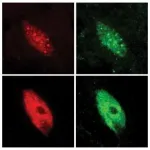Study finds breast cancer's response to tumor stiffness may predict bone metastasis
2021-06-30
(Press-News.org) In cases of breast cancer, bone metastasis - when cancer cells spread to new sites in the bone - causes the most breast cancer-related harm and is often incurable in advanced disease. A new study by University of Arizona Health Sciences researchers found that cancer cells become more aggressive when exposed to tissue stiffening and that these changes persist over time.
Tumor stiffening, which develops as diseased breast tissue becomes fibrotic, plays a major role in how breast cancer cells spread throughout the body. The paper, "Breast tumor stiffness instructs bone metastasis via maintenance of mechanical conditioning," published today in the journal Cell Reports, found that the stiffness of the breast tumor microenvironment can cause changes to cancer cells that make them more aggressively spread to the bone. The resulting changes are maintained as "mechanical memory," which instructs the cancer cells to send signals that lead to the breakdown of bone. Once this happens, patients often suffer debilitating complications like spontaneous fractures.
"Unfortunately, bone metastasis is normally not identified until an advanced state when it's not reversible," said senior author Ghassan Mouneimne, PhD, associate professor of cellular and molecular medicine and cancer biology in the UArizona College of Medicine - Tucson. "What's really exciting is one day being able to take a sample from the patient's primary tumor and predict who is at high risk for bone metastasis. Then we could intervene with a prevention strategy that we are now validating in the lab."
The study, which is the first to demonstrate the concept of mechanical memory during cancer metastasis, developed a novel mechanical conditioning, or "MeCo," score, to quantify the cellular changes. Eventually, researchers hope the MeCo score can be used to help identify breast cancer patients who might benefit from repurposed antifibrotic treatments to prevent bone metastasis.
"The higher the patient's breast tumor MeCo score, the higher the likelihood they would go on to have bone metastasis and poorer outcomes," said Casey Romanoski, PhD, assistant professor of cellular and molecular medicine and a member of the BIO5 Institute and UArizona Cancer Center. "This stiffness signature could have incredible clinical utility."
To further explore the clinical application, Dr. Mouneimne and Adam Watson, PhD, a former graduate student and postdoctoral fellow at the UArizona Cancer Center, worked with Tech Launch Arizona, the office of the university that commercializes inventions stemming from research, to launch a startup, MeCo Diagnostics, LLC. The company is working toward maturing the technology and bringing it to the marketplace where it can impact the lives of breast cancer patients everywhere.
It was previously known that tumor stiffness induces cellular changes that lead to a more aggressive cancer, but according to Dr. Watson, lead author on the paper, the concept of "stiffness" was misleading.
"Most early-stage breast tumors are stiffer than surrounding tissue, yet most don't spread to bone," he said. "It's not about tumor stiffness but rather stiffness responsiveness of the cancer cells, which we call mechanical conditioning."
To study this phenomenon, the team created a laboratory environment that mimicked the stiff or soft tumor environments encountered in the body and assessed how breast cancer cells responded. They found that cells grown in a stiff environment had a "mechanoresponse" characterized by cell spreading, invasion and turning on genes linked with both bone development and disease. And these gene changes endured even after the cells were moved to a soft environment.
Next, researchers looked at what genes were turned on and off in breast cancer cells in response to the stiff environments. Based on these gene expression changes, they developed the MeCo score, which was validated and refined using data from thousands of patients with breast cancer.
"This is the culmination of a lot of work by researchers from many different fields," Dr. Mouneimne said. "It highlights the environment we have at the University of Arizona Health Sciences, and how working together can make progress in this challenging area of breast cancer metastasis."
Future investigations could focus on how cancer cells maintain the gene expression changes that drive metastasis, based on additional findings that identified a transcription factor called RUNX2 that was activated by fibrotic-like stiffness. RUNX2 stays attached to the DNA as the cell divides and "bookmarks" which genes remain turned on, which includes the genes that drive bone metastasis and the breakdown of bone.
INFORMATION:
ELSE PRESS RELEASES FROM THIS DATE:
2021-06-30
A pair of College of Business professors and their doctoral student at The University of Texas at Arlington are exploring how ransomware attacks sometimes pit organizations against the law enforcement agencies trying to protect them.
Kay-Yut Chen, Jingguo Wang and Yan Lang are authors of a new study in the journal Management Science titled "Coping with Digital Extortion: An Experimental Study on Benefit Appeals and Normative Appeals." Chen and Wang are professors of information systems and operations management at UTA. Lang is a doctoral student in the department.
A ransomware attack is like a cyber hijacking, with criminals infiltrating and seizing an organization's data or computer systems and ...
2021-06-30
In hospitals, we know that the nurses are the first to deal with patients in pain. For any ailment, including patients needing hemodialysis, the knowledge of pain management, the nurses have, allow them to provide optimal pain management.
This qualitative study aims to explore the experiences, perceptions, and beliefs of nurses serving in the hemodialysis unit in terms of pain management practices. The study helped identify the educational needs of the nurses to improve pain management in practice. A subjective sample of 16 nurses working in four out-patient hemodialysis units in Amman, Jordan, was hired for this research. Using semi-structured interviews, the data was collected.
The study found five themes and fifteen subcategories ...
2021-06-30
Oak Brook, IL - The July edition of SLAS Discovery is a Special Edition featuring the cover article, "Development of a High-Throughput Screening Assay to Identify Inhibitors of the SARS-CoV-2 Guanine-N7-Methyltransferase Using RapidFire Mass Spectrometry" by Lesley-Anne Pearson, Charlotte J. Green, Ph.D., De Lin, Ph.D., Alain-Pierre Petit, Ph.D., David W. Gray, Ph.D., Victoria H. Cowling, Ph.D., and Euan A. F. Fordyce, Ph.D., (Drug Discovery Unit, School of Life Sciences, University of Dundee, Dundee, UK).
In January 2021, a survey of immunologists, infectious-disease researchers and virologists found that 90% of respondents believe SARS-CoV-2 will become endemic, continuing to circulate in pockets of the global population for years to come. Even as vaccines are ...
2021-06-30
Boulder, Colo., USA: GSA's dynamic online journal, Geosphere, posts articles online regularly. Locations and topics studied this month include the central Appalachian Mountains; fossil pollen in Colombia; the precision and accuracy of model analyses; the Bone Spring Formation, Permian Basin, west Texas; and the geochronology of modern river sediment in south-central Alaska. You can find these articles at https://geosphere.geoscienceworld.org/content/early/recent .
Spatially variable syn- and post-Alleghanian exhumation of the central Appalachian Mountains from zircon (U-Th)/He thermochronology
Luke C. Basler; Jaclyn S. Baughman; Michelle L. Fame; Peter J. Haproff
Abstract: To assess spatial and temporal patterns of Phanerozoic orogenic burial and subsequent ...
2021-06-30
Key Takeaways:
Research reveals consumer demand declines when product packaging and marketing materials removed the claim, "Made in USA" and increase when the claim was featured.
The impact on sales is insufficient to convince some companies to manufacture more products in the United States but enough to incentivize companies to make deceptive "Made in USA" claims.
CATONSVILLE, MD, June 30, 2021 - Pick up any product in just about any store and you're likely to find information that indicates the country of origin of the product. The U.S. Federal Trade Commission (FTC) requires this for any imported product, but not for products made in the United States. When you see the words "Made in USA" on a product, it's purely for marketing purposes. So, does it work?
According to a ...
2021-06-30
LA JOLLA--(June 30, 2021) Scientists--and gardeners--have long known that plants grow taller and flower sooner when they are shaded by close-growing neighbors. Now, for the first time, researchers at the Salk Institute have shown the detailed inner workings of this process.
The study, published June 17, 2021, in Nature Genetics, offers a new understanding of how gene activity directs plant growth, and how quickly plants respond to their environment--with shifting light conditions triggering molecular changes in as little as five minutes. The findings provide insights ...
2021-06-30
When it comes to defense, the body relies on attack thanks to the lymphatic and immune systems. The immune system is like the body's own personal police force as it hunts down and eliminates pathogenic villains.
"The body's immune system is very good at identifying cells that are acting strangely. These include cells that could develop into tumors or cancer in the future," says Federica Eduati from the department of Biomedical Engineering at TU/e. "Once detected, the immune system strikes and kills the cells."
Stopping the attack
But it's not always so straightforward as tumor cells can develop ways to hide themselves from the immune system.
"Unfortunately, tumor cells can block the ...
2021-06-30
Growing resistance to our go-to antibiotics is one of the biggest threats the world faces. As common bacteria like strep and salmonella become resistant to medications, what used to be easily treatable infections can now pose difficult medical challenges.
New research from the University of Georgia shows that there may be more antimicrobial-resistant salmonella in our food animals than scientists previously thought.
Using technology she developed, UGA researcher Nikki Shariat and Amy Siceloff, a first-year doctoral student in UGA's Department of Microbiology, found that traditional culturing methods used to test livestock for problematic bacteria often miss drug-resistant ...
2021-06-30
Since the onset of the COVID-19 pandemic last year, medical experts have stressed the importance of having a plan in the event of a positive test result. Where should you self-isolate? Do you have personal protective equipment for family members? Who should you notify about your diagnosis? An overwhelming 96% of healthy, educated adults surveyed by University of Houston researchers in the early stages of the pandemic did not have a comprehensive plan in mind, while 62% didn't have a plan at all.
"What that suggests is that it was difficult even for very high functioning people to digest and use all the complex information that was quickly emerging about ...
2021-06-30
Following the first wave of SARS-CoV-2 infections in spring 2020, Europe experienced a resurgence of the virus starting late summer. Although it appears clear that travel had a significant impact on the circulation of the virus, it remains challenging to assess how it may have restructured and reignited the epidemic in the different European countries.
In a new study published in the journal Nature this June 30th, 2021, Philippe Lemey - Rega Institute, KU Leuven, Simon Dellicour - SpELL, Spatial Epidemiology Lab, Université Libre de Bruxelles, and their collaborators, built a phylogeographic model to assess how newly introduced viral lineages, as opposed to ...
LAST 30 PRESS RELEASES:
[Press-News.org] Study finds breast cancer's response to tumor stiffness may predict bone metastasis



